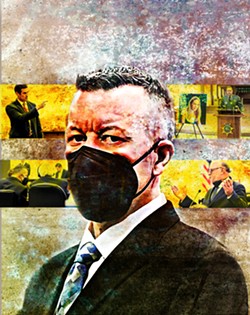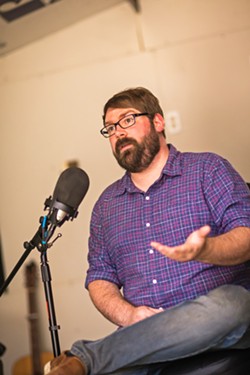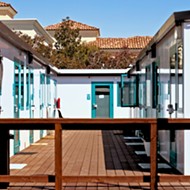On trial: Your Own Backyard podcaster Chris Lambert fills us in on the progress of the Salinas-based murder trials for Kristin Smart
By Peter Johnson[{
"name": "Newsletter Promo",
"id": "NewsletterPromo",
"class": "inlineCenter",
"insertPoint": "4",
"component": "15264767",
"requiredCountToDisplay": "0"
},{
"name": "Ad - Medium Rectangle CC01 - 300x250",
"id": "AdMediumRectangleCC01300x250",
"class": "inlineCenter",
"insertPoint": "8",
"component": "2963441",
"requiredCountToDisplay": "12"
},{
"name": "Ad - Medium Rectangle LC01 - 300x250",
"id": "AdMediumRectangleCC01300x250",
"class": "inlineCenter",
"insertPoint": "18",
"component": "2963441",
"requiredCountToDisplay": "22"
},{
"name": "Ad - Medium Rectangle LC09 - 300x250",
"id": "AdMediumRectangleLC09300x250",
"class": "inlineCenter",
"insertPoint": "28",
"component": "3252660",
"requiredCountToDisplay": "32"
}]
More than 25 years after Kristin Smart's disappearance, the murder trial for her alleged killer, Paul Flores, and his father, an alleged accessory, finally started in July.
In opening arguments, SLO County prosecutor Chris Peuvrelle laid out the case to two Monterey County juries: that Paul raped and killed Smart in his Cal Poly dorm room in 1996, and that Ruben Flores, his dad, helped conceal her body under his Arroyo Grande deck.
The trial was moved to Salinas, and the court isn't allowing any video or audio recordings of it. Chris Lambert—whose Your Own Backyard podcast is credited with renewing interest in the case—is there every day providing hourly updates on social media as well as weekly podcasts. He's staying in a one bedroom, one bath guesthouse a few miles north of Salinas that a podcast fan offered up during the trial.
New Times caught up with the Orcutt native by phone on Aug. 9 during an unexpected day away from court. One of the jurors called out sick, something Lambert said might happen a lot with 40 jurors (two jury pools) involved in the trial.
New Times: Are you traveling to and from Salinas or are you staying there full time?
CL: I'm leaving [Salinas] typically on Friday evenings. I get home and my entire Saturday and Sunday is spent writing and then recording and editing the podcast update. And then Sunday evening, I get back on the road to come up here. It's chaos. I'm totally not sleeping enough. I'm usually up until midnight, 1 a.m., and then I gotta get up at 5:30 a.m. to get to the courthouse. Because they only let five journalists a day into the courtroom, I have to be there early.
NT: What're your thoughts on the media restrictions that have been put on this trial?
CL: Personally, I don't know enough about stuff like this. This is my first trial experience. It seemed unusual to me but it wasn't until I started talking to the other reporters that they were like, no, this is, like, way outside the bounds. And the weirdness I have noticed is that the courthouse staff is super cagey about answering any questions. You ask where I should park? How do I do this or that? And they say oh I can't tell you because of the gag order. So it's gotten weird.
NT: Have you heard an explanation for that?
CL: No. But I think it's a combination of the fact that Monterey County hasn't dealt with a huge case like this before—the Rex Krebs trial in 2001 was the last—and the other thing is because the defense has insisted that Paul is being wrongfully accused because he's a victim of publicity, they're trying to restrict every possible way for the defense to say, "See, the media is making this a circus." So I think they're going over the top to try to prevent that.
NT: Can you describe the courtroom itself? Is it pretty small?
CL: It is. The entire left side of the courtroom is all the jurors. The audience is all crowded into the right side of the courtroom. There are five to six pews and we're just the back three rows. I usually get to the courthouse about 7:30 a.m. and it usually gets me a seat. Today, I was super late and I still got Seat 2, and then they canceled. The rest of the media is only able to come up on certain days, so sometimes they all come up at once, and some days it's just me.
NT: What's your opinion of Peuvrelle's performance thus far? What's his strategy been?
CL: He made a comment during pre-trial to the judge that because there are so many witnesses—there's I think between 80 and 100, and it's long distance for some of them—they may not be able to go quite in chronological order. But so far, they've seemed to be going in order. They started with Kristin's family, then the last time she was seen, who was with her, and then they're going through the party and all these people who contradict Paul's statements. I guess the strategy is, because it's a circumstantial case, to remove any doubt that this is the person responsible. And then the next steps I guess will be the science, like the cadaver dog stuff, the soil science, to show there's also no doubt that a human died in Paul's dorm room and a human was buried under his dad's deck. So, do you believe those were all coincidences? Because the jurors are human, you're going to have that human element of it's almost like a coin toss. Are they going to be able to convict somebody without hard DNA evidence? Or are they going to see all the signs here, and go yes, that's enough to put this guy away because it's so clear what happened. I think the DA's Office is doing as good of a job as they can with the case that they've got. I think the defense is making it kind of easy for them, with the way they're doing things. They seem like they're not really organized. It feels like the prosecution is on top of things, they know what they're doing, and they're making the defense look unprepared.
NT: On that subject, your reporting suggests that the defense's cross examinations are not going over very well with the judge and jury.
CL: That would be my take on it, but I'm clearly not an impartial source. I've wondered, am I just biased in the way I'm reporting this, or is this what's really happening? But I've been talking to members of the public who attend, and every time there's a break in the trial, they're like, "What's going on in there? What a mess!" It's exhausting and it's messy and when a witness finally gets excused, you're like, oh, so all of that wasn't even leading up to some huge revelation. I'm trying to be as fair and balanced in my reporting as I can, because clearly I'm involved with this, but my take is everyone in the courtroom is feeling the same way. [The defense] tends to question Kristin's behavior a lot, which I don't think goes over well with jurors. There's a lot of victim shaming going on and their main strategy is to suggest well, this girl was so wild, who knows what happened? But what I think their biggest detriment is they have not provided or even suggested an alternative explanation. It's just everything—well maybe she went to be a model, maybe she got pregnant and ran away, or maybe someone else killed her. And you're like wait, it can't be all of those things. I know from a legal standpoint they don't have to prove what happened to her, but the way they're going about it is so scattered.
NT: You made a point in your podcast that the jurors for Paul's trial are younger, while Ruben's are older. Is that noticeable in how the trial is playing out?
CL: It is to me. I'll look over at the jurors to see if they're following along and how they're reacting to things. When's Paul's jury is up there, I can usually kind of watch them, and they're around my age, so I can read them a little better. But with Ruben's jury, they're mostly over 50, and for me they're a little harder to read. I can't tell what they're thinking or how they're feeling. But there are a couple people who are really expressive, which I appreciate. There's one guy who every time the defense attorney is talking up there and dragging things on, he'll just put his head in his hands and shake his head really hard. A lot of people seem to be feeling that, they're just exhausted by his tactics, but this one guy really shows it.
NT: How would you describe the emotional ups and downs? How do the two families seem to be doing?
CL: It gets super emotional. Last week there were actually a couple of jurors who started crying during some of the testimony. And other times it's really tense, and somebody will say something or do something, and jurors will laugh. I think the judge is doing a great job so far and she's been really kind of shepherding everybody in a really good way. She's lighthearted with the jurors, but she's also firm when she needs to be. Between the cross-examination and stuff, things get really heated sometimes. And some days, a lot of days, are just really, really slow, like painfully slow. The weird part is no members of the Flores family have been present. Susan [Paul's mother] came for the opening statements and then she left once testimony started. And now, nine days in, she hasn't come back. There's nobody in the audience for the Flores family, it's only Ruben and Paul. Every once in a while they whisper to each other. You don't really get any reaction from them at all. For the Smart family, there's been times that particularly Kristin's mom just needs to leave the room. There's stuff that's just too much, like when they start talking about soil samples and how much blood was in the soil. I feel awful for them.
NT: In pre-trial, the judge ruled to allow women from the LA area who said they were raped by Paul more recently to testify in the trial. They had been excluded from the preliminary hearings. How significant is that development?
CL: That being excluded from the prelim was a huge letdown. I think it's so significant. The analogy I made is imagine you loaned someone a red jacket and then they told you they'd lost it and you were like, I kind of feel like this guy still has my red jacket. And then years and years go by and you've never been able to find your red jacket, but then you go to his house and you find a closet full of other peoples' red jackets. You're like, I still haven't found mine, it's not one I'm looking for, but this guy is obsessed with red jackets, so what are the chances he didn't take mine? That's what we've got here. We haven't found Kristin but this guy's pattern is to either drug or follow drunk women, separate them from their friends under the guise of taking them home, and instead takes them to his place and rapes them. The fact that Kristin was last seen in his company, moments after he asked another girl for a kiss, what are the chances he didn't try to take advantage and somebody else killed her? The chances are so impossible. So I think it's really important.
NT: The defense recently filed another (unsuccessful) subpoena to try to gain access to all of your podcast notes and sources. Were you surprised?
CL: Somebody had told me that just because it was dismissed in the prelim doesn't mean they couldn't try again. So I wasn't surprised they did it, but I was surprised at the timing. It was Sunday. Are they just trying to keep me out of the courtroom? I fought it and got it quashed. There's still the possibility they could try again. They're not completely shut down. They want to leave that door open. They made a request to the judge that I not delete any files. They want to go through my emails, my text messages and it's just not going to happen. I'm not willing to turn that stuff over because there are so many anonymous sources I'm not willing to jeopardize. They're trying to poke holes in the witnesses' credibility and they want to do it through me, and I think that's improper.
NT: How are you managing to take handwritten notes of the entire trial and turn those into weekly podcasts? How are the new episodes different from the original ones?
CL: Between the prelim and now, I've had a lot of handwriting practice. It's not affecting me as much as it was during the prelim. Two or three days into the prelim, I wanted to cut my hand off. This time around I got the hang of it. I'm much better at it than I was before. I think I go through five or six legal pads a week. I wanted the podcast episodes to be new, but also the same. It's slightly different tone and all that. I really wanted to emphasize—and it's funny because some people don't seem to understand—I made it really clear in the intro that these are not documentary episodes. These are just me reading my notes. And I've already gotten two or three bad reviews on Apple Podcasts saying, "I hate these trial episodes, they're just so boring." And it's like, OK, I'm doing the best I can, and it's either this or nothing. There are days where no other journalists are present, so this is all you have of what happened that day until the transcript is released. So I'm doing the best I can and it just can't possibly be documentary quality once a week. That's just not feasible. I'm trying to do a pretty straight blow by blow so you can follow what happened in the courtroom. Because the jurors shouldn't be listening to my podcast, my podcasts are really only for the public. So I figured there's no harm in me also letting the public know, here's what's being said in the courtroom, but this is not true. I have a timeline that proves this is not true. So they're pulling a smoke screen over the jurors, but the public should know better. I'm trying to provide commentary where it feels necessary while not judging too much.
NT: Is there anything in the recently unsealed case records that was groundbreaking to you or was it mostly stuff you already knew?
CL: It was stuff I already knew almost entirely but with more details than I knew. I knew they investigated Scott Peterson because it was like, well, he went to Cal Poly let's just look at him. But I didn't know the detail they went into, like how much they looked into him. It was mostly just filling in details of things I already heard or things I'd heard rumored but finally got to see on paper.
NT: During the trial, do you ever reflect on all that's led up to this point, and how improbable it seemed in 2019 that this case would get here?
CL: I guess I sort of feel like I'm mostly in a brain fog, just because it's so about the logistics of how am I going to get up to Monterey County this week, what time do I need to leave, what time do I have to wake up to get to the courthouse, and how I am going to get an episode done before I go back. But there are few times when I'm sitting in the courtroom and that lifts for a bit and I'm like, whoa, this is happening. It's like I'm watching a movie play out where all these characters that I've done so much research on, now they're sitting in front of me and talking about this. It's been very surreal for me. And having the Smart family just a couple rows ahead of me, it's been pretty tough because I really care about them. Watching them has been difficult because the strategy in the courtroom has been to attack Kristin's character a lot. And after waiting so many years for some kind of resolution to this, that here we are in a courtroom and it's going to start with well, let's talk about how awful your daughter was, I think it's probably really, really tough for them. So I'm looking forward to once this is all resolved, being able to get together with them again, to be able to all celebrate one way or another, not necessarily a conviction, but that this is finally out of the way. This didn't seem like it was ever going to happen. At the time I picked it up, it felt like the Kristin Smart case is that local case we all talk about, how come it never got solved? It didn't feel like this would happen. And the defense attorneys have said a number of times that my podcast was "designed to convict Paul Flores." And I know that's just smear, that's their angle on it, but it couldn't be further from the truth. Whoever saw Paul Flores being convicted? That was not my goal. It was just, does anyone know what happened? Does anyone know where Kristin is? Getting into court was not a goal of mine and I didn't see it happening. And honestly once it's done, I think we're all just going to be relieved that it's over, regardless of the outcome. Δ
Assistant Editor Peter Johnson can be reached at [email protected].
Latest in News
Comments (3)
Showing 1-3 of 3
Readers also liked…
-

Coast Unified teachers upset over new position's salary and qualifications
Oct 20, 2022 -

SLO police identify alleged driver who hit and killed couple
Dec 22, 2022 -

When the levee breaks: Oceano residents, county officials walk a tightrope of regulations to manage Arroyo Grande Creek, which some say led to the levee's failure in January
May 18, 2023










